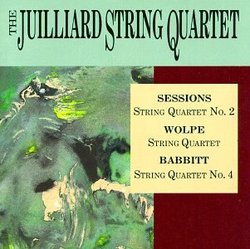| All Artists: Sessions, Wolpe, Juilliard Quartet Title: String Quartet 2 / String Quartet 4 Members Wishing: 0 Total Copies: 0 Label: Composers Recordings Release Date: 6/10/1994 Genre: Classical Styles: Chamber Music, Historical Periods, Modern, 20th, & 21st Century Number of Discs: 1 SwapaCD Credits: 1 UPC: 090438058728 |
Search - Sessions, Wolpe, Juilliard Quartet :: String Quartet 2 / String Quartet 4
 | Sessions, Wolpe, Juilliard Quartet String Quartet 2 / String Quartet 4 Genre: Classical
|
Larger Image |
CD Details |
CD ReviewsAn unknown masterpiece TheDAC | California | 07/21/2003 (5 out of 5 stars) "While I originally purchased this disc out of curiosity for the Babbitt, I unwittingly unearthed a gem in the Sessions quartet. This is an immensely beautiful work that ebbs and flows between spareness and density in a way that the works of Schoenberg or Bartok (of whose work Sessions is standing on the shoulders of, here) rarely do. This is hyper-romanticism at it's finest. Although I have not connected with any other Sessions composition since, I can count this masterpiece as one my favorite quartets of all time." Not a disc I'll come back to for pleasure and enjoyment Discophage | France | 01/16/2009 (2 out of 5 stars) "The Juilliard Quartet is one of the most esteemed String Quartets to have performed in the second half of the 20th Century, and one of their most admirable features is their embrace, from their inception, of contemporary music (starting with Bartok and Schoenberg and moving on with their times, all the way to Carter and Babbitt). The Quartet was in fact founded in 1946 by William Schuman, then dean of the Juilliard School, precisely for that purpose: "a quartet that would play the standard repertoire with the sense of excitement and discovery of a new work and play new works with a reverence usually reserved for the classics". So you would expect them to be non pareil in that type of repertoire. I was amazed to hear that it, here, was far from the case.
These recordings were made between 1987 (Sessions) and 1990 (Wolpe). Sessions and Babbitt are live recordings, but you don't really hear any audience noise. I pulled the disc out of my shelves for the purpose of comparing the Juilliard's reading of Roger Sessions 2nd Quartet from 1951 to the 1974 recording by the Kohon Quartet, reissued on a convenient 2 CD-set by Vox (see my review of American String Quartets 1900-1950). I really wanted to check how inferior to the demands of the music the Kohon Quartet really was back then: they were never considered a major string quartet but rather one of those second-rate ensembles that recorded much obscure repertoire for Vox and that one satisfied oneself with for want of anything better; I also had lousy memories of their scrawny recording of Ives' 2nd Quartet. Given these expectations, I was amazed to hear how inferior the Juilliards were to the Kohons. First, it has to do with the sonics: the 1974 Vox recording is spacious and natural, the 1987 CRI for the Juilliards sounds awfully congested and mono-dimensional. But it has also to do with interpretation. I think the blame lies mainly on 1st fiddler Robert Mann. He'd been at the helm since the very beginning, he was nearing 70 when this recording was made and I suppose that by then his technical fluency had lapsed. His tone is uningratiating, small, lacking bloom and power, and his pitch is sometimes on the edge. In comparison, Harold Kohon's tone is stellar, powerful, involved. The sonics also give Mann a somewhat backward placement - so as to not expose his flaws too much? Moreover, and perhaps because of Mann's difficulties, the fast sections lack the kind of dynamism and raw energy that the Kohons bring to them. The Juillliards make Sessions Quartet sound like "contemporary music" - the Kohons make it sound like music. So, now, if Stefan Wolpe's String Quartet from 1969 sounds like furious Webern, a cliché of serialist contemporary music made of disjointed, jagged and thorny phrases, is it because it is supposed to sound that way, or because the Juilliards make it sound that way? I'd have to hear some other ensemble play it - but what I hear here certainly gives me no incentive to listen again. Babbitt's 4th String Quartet is what you expect of Babbitt: pointillistic, dry, busy. You remember those early essays in tape music? That's what it sounds like, for String Quartet. The liner notes quote Babbitt saying that listening to his works is like listening to Hungarian for the first time: it doesn't necessarily make sense on first hearing. No, but you can hear a musicality in Hungarian, even if you don't understand it. Babbitt is Hungarian spoken in a nuthouse (filled with highly rational and logical people -only their reason and logic are severely twisted). But then, I listen to music for enjoyment and pleasure, not mathematical demonstration, so I guess Babbitt isn't for me. Good liner notes, TT 71 minutes. This is not a disc I'll come back to for pleasure and enjoyment - Babbitt and Wolpe wouldn't ask, I guess, for a better compliment. P.S. As it turns out, I do have another version of Wolpe's Quartet, by the Concord String Quartet, American String Quartets, 1950-1970. So I'll return to this review ASAP. P.S.2. Well - I have. Again, the 1972 Concord String Quartet is much better recorded than the Juilliard Quartet. Besides the much clearer and vivid instrumental character thus afforded, their reading is more spacious and relaxed, with less bite than the Juilliards but allowing for more whimsicality and playfulness - welcome features. They also have more bounce and dynamism in the second movement. However, the music is NOT made more enjoyable. There are apparently things that even the best performers can't achieve." |

 Track Listings (8) - Disc #1
Track Listings (8) - Disc #1